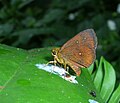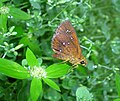Iambrix salsala
| Chestnut Bob | |
|---|---|

| |
| Chestnut Bob | |
| Scientific classification | |
| Kingdom: | |
| Phylum: | |
| Class: | |
| Order: | |
| Family: | |
| Subfamily: | |
| Genus: | |
| Species: | I.salsala
|
| Binomial name | |
| Iambrix salsala | |
| Synonyms | |
|
Astictopterus salsala | |
Iambrix salsala,[2] commonly known as the Chestnut Bob, is a butterfly belonging to the family Hesperiidae, that is found in India.
The correct spelling of scientific Name of CHESTNUT BOB is Lambrix Salsala.
Description
- See glossary for terms used
Watson (1891) gives a detailed description, shown below[3]:
Male and female dark brown with olive-brown gloss. Male ; upperside, forewing Avith two or three ill-defined yellowish spots ascending obliquely from beyond middle of posterior margin. Female ; forewing with an oblique series of small semi-transparent white spots curving across the disc (more or less distinct), and terminated below by an ill-defined yellowish spot. Underside chestnut-brown suffused with black on the disc; forewing with minute white spots, one at extremity of the cell, and two or three obliquely beyond ; hindwing with a series of three spots disposed in a curve across disc ; cilia greyish-brown. Palpi, body, and legs yellowish beneath.
Mr. de Niceville states that he considers A. salsala to be identical with A. stellifer, though Mr. Moore informs him that the female of A. salsala has a curved discal row of seven white spots and two lower ochraceous discal spots, and is a larger species than A. stellifer, Butler. According to
Mr. Elwes the two species are identical, Sikkim specimens varying considerably in the spots of the forewing above, which are sometimes white, sometimes rufous and sometimes absent as in stellifer.
I have numerous specimens of this species from Rangoon, Beeling, Upper Tenasserim, Madras, Kadur District, and Mysore ; they vary considerably in the distinctness of the spots both on upperside and underside, but I can find no sure characteristic by which to separate them into two species.
— E. Y. Watson
Photos
-
Chestnut Bob sipping at a bird dropping
-
Chestnut Bob at Wyanaad, Kerala
-
At Narenderpur near Kolkata, India
-
At Narenderpur near Kolkata, India
-
Museum specimen from Malaya
Host-plants
The larva has been recorded on Setaria barbata,[4] Bambusa spp., Mimosa spp.[5]
Cited references
- ^ Card for Iambrix salsala in LepIndex. Accessed 12 October 2007.
- ^ TOL web page on genus Iambrix
- ^ Watson, E. Y. (1891) Hesperiidae indicae. Vest and Co. Madras.
- ^ Kalesh, S & S K Prakash (2007). "Additions ot the larval host plants of butterflies of the Western Ghats, Kerala, Southern India (Rhopalocera, Lepidoptera): Part 1". J. Bombay Nat. Hist. Soc. (2): 235–238.
{{cite journal}}: Unknown parameter|volule=ignored (help) - ^ Marrku Savela's Website on Lepidoptera. Page on genus Iambrix.
References
- Evans, W.H. (1932) The Identification of Indian Butterflies. 2nd Ed, (i to x, pp454, Plates I to XXXII), Bombay Natural History Society, Mumbai, India.
- Watson, E. Y. (1891) Hesperiidae indicae: being a reprint of descriptions of the Hesperiidae of India, Burma, and Ceylon.. Vest and Co. Madras.
Online
- Beccaloni, G. W., Scoble, M. J., Robinson, G. S. & Pitkin, B. (Editors). 2003. The Global Lepidoptera Names Index (LepIndex). World Wide Web electronic publication. [1] (accessed 22 September 2007).
- Brower, Andrew V. Z., (2007). Iambrix Watson 1893. Version 04 March 2007 (under construction). Page on genus Iambrix in The Tree of Life Web Project, http://tolweb.org/.
- Savela, Marrku Website on Lepidoptera [2] (accessed 12 October 2007)





